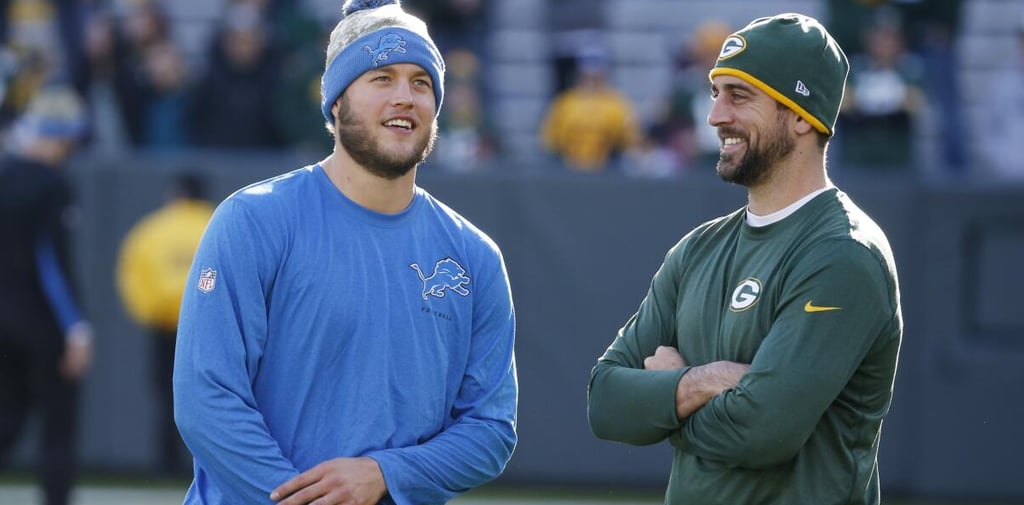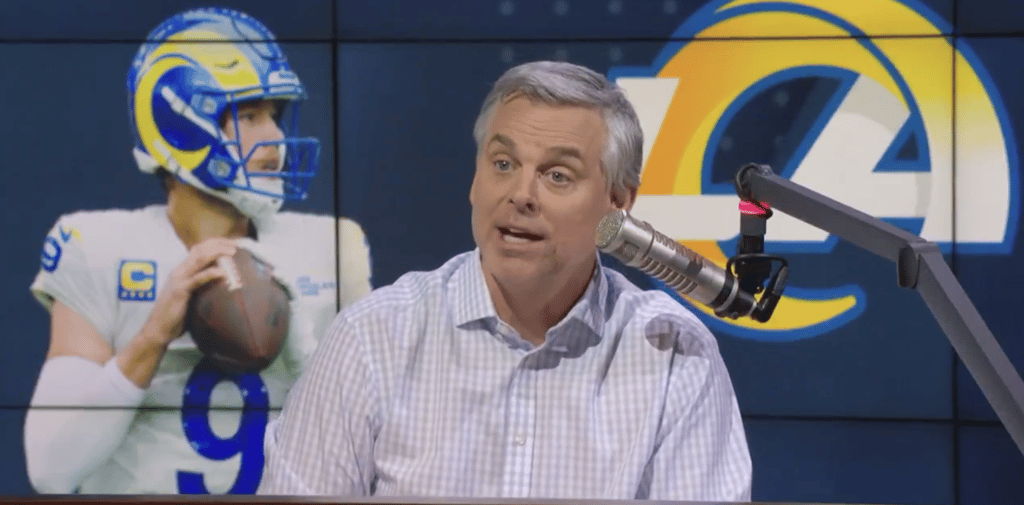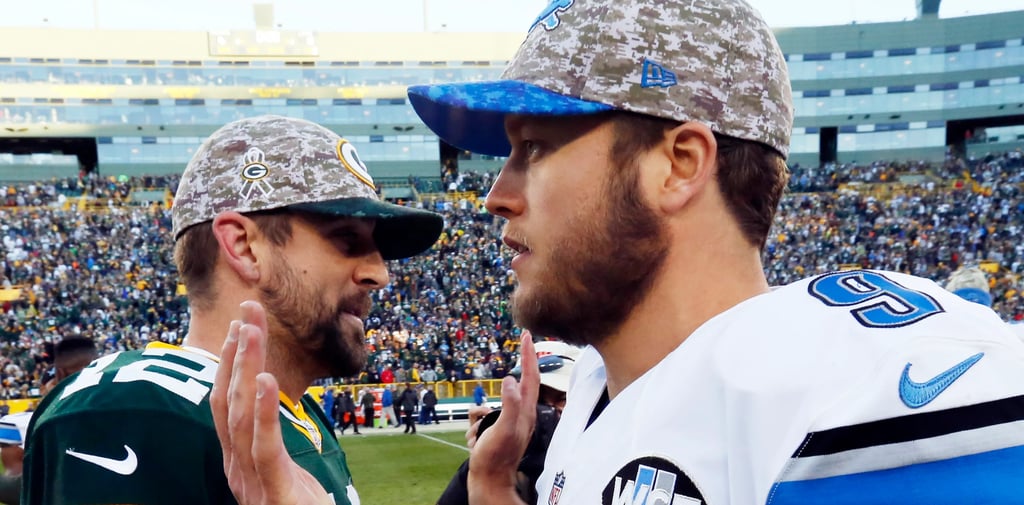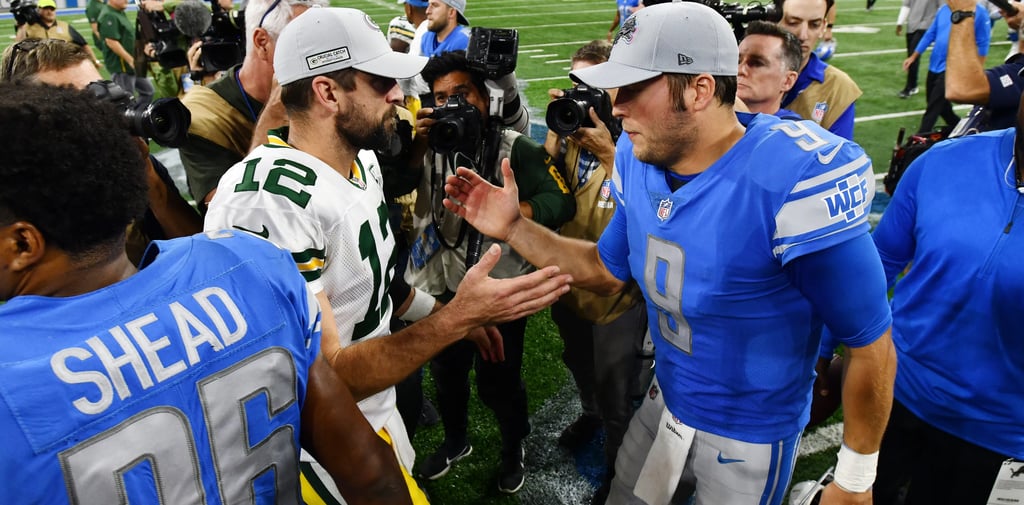Stop Comparing Matt Stafford to Aaron Rodgers
Colin Cowherd takes some leaps with his takes, but this one is just crazy enough to write about.
SPORTS
Serafino Diaz
7/4/20259 min read


FS1 talk show host Colin Cowherd is no stranger to hot takes. As a longtime fan of The Herd, I usually enjoy his takes, even if sometimes I disagree with them. One recent take, however, left even this diehard fan puzzled. While reacting to Aaron Rodgers signing with the Pittsburgh Steelers on his podcast, Cowherd boldly declared that if Los Angeles Rams quarterback Matthew Stafford wins a second Super Bowl, he’ll be better than Rodgers all time. Wait—what?
Let’s be clear: their careers shouldn't be compared. While both quarterbacks currently have one Super Bowl ring, the similarities end there. Rodgers has four NFL MVPs, five All-Pro selections, and an overall career that's multiple tiers above Stafford’s. And that’s only the beginning of the gap between them. Let’s take a closer look at why this comparison is invalid.


This Take Screams Pure Bias
It’s no secret that Cowherd has had a longtime vendetta against Rodgers. Alongside Skip Bayless, he was one of the few national sports analysts constantly criticizing Rodgers during the height of his popularity. Cowherd’s vendetta, however, is personal. Before the Packers’ Super Bowl XLV win, Cowherd refused to call Rodgers an elite quarterback until he won a Super Bowl. After Rodgers did so, he called up Cowherd’s show and asked him “am I elite to you now?” Since then, Cowherd has relentlessly criticized him while rarely offering praise. While some of his criticisms are valid, the constant negativity eventually becomes exhausting.
Meanwhile, Cowherd’s biases toward Stafford stem from one thing—homerism. When Stafford was with the Lions, Cowherd was one of his most vocal critics—calling him the embodiment of the “mythology of talent” and, when he was on the trading block, questioned why any team would want a quarterback with just four winning seasons in 12 years. Once Stafford landed with the Rams, however, his opinion did a complete 180, largely because Cowherd himself lived in Los Angeles at the time. Stafford suddenly became one of his favorites, and after he won his Super Bowl, Cowherd began floating the idea that he might be better than Rodgers all-time.
The way Cowherd talks about Stafford has become similar to how some Michael Jordan fans talk about his career: focusing only on his championship years while ignoring his early career playoff exits, his 1995 Eastern semis loss to the Magic, and his failed tenure with the Wizards. The longer Stafford is with the Rams, the more Cowherd seemingly acts like his Lions tenure never existed and that he's only played for the Rams. News flash, Cowherd—that's not how it works.


Why Didn’t Stafford Ever Win The NFC North?
Here’s a stat that flies under the radar: Stafford never won the NFC North in 12 seasons with the Lions. Yes, the Lions were a dysfunctional franchise—but that only excuses so much. What’s harder to justify is that significantly inferior quarterbacks won the division while Stafford never did.
During his Lions tenure, the division, when not being won by Rodgers, was won by the likes of 40-year-old Brett Favre, Jay Cutler, Teddy Bridgewater, Case Keenum, and Mitchell Trubisky. Bridgewater threw just 14 touchdown passes in his division-winning season, Keenum was a journeyman who had one great year, and Trubisky was carried by an elite Bears defense. Meanwhile, Stafford couldn't win the division once despite having three prime opportunities to do so. Let's go over these opportunities.
In 2014, the Lions were 11-4 with the league’s second-ranked defense heading into a Week 17 showdown against the Packers for the division title. The Lions had two things going for them before this game—they had already beaten the Packers earlier in the year, and Rodgers suffered a calf injury the previous week that was sure to limit his mobility in this game. The Lions would fall to the Packers, mostly because a one-legged Rodgers diced up the Lions (despite leaving the game due to injury at one point) while Stafford underwhelmed.
In 2016, another golden opportunity arose. Heading into Thanksgiving weekend, the Lions were 6-4 while their divisional rivals were struggling. The Packers were 4-6, the Vikings were collapsing after a 5-0 start to the year, and the Bears were in the midst of a 3-13 season. The Lions were 9-6 heading into the final week of the season, but there was one problem—the Packers caught up to them after winning five straight games. As a result, just like in 2014, the Lions and Packers would play for the division crown in the season finale. And just like in 2014, Rodgers carved up the Lions while Stafford didn't have his best game. As a result, the Packers once again won the division.
Finally, there was 2017. This should have been THE year for Stafford to win the division. The Lions had a good team, Rodgers missed nine games that year due to injury, and although the Vikings had a loaded roster, their quarterback was Keenum. On top of that, they had beaten those Keenum-led Vikings early in the year. The division should have been Stafford's to lose, but once again, he underwhelmed. The Lions would go on to finish 9-7 and miss the playoffs, while the Vikings won the division and went to the NFC Championship Game. Stafford was the best quarterback in the division that year, and one of Cowherd’s mottos when making playoff predictions is that “the best quarterback wins every division.” By Cowherd’s rule, Stafford should’ve seized that moment and he didn’t.
Stafford also struggled against his divisional rivals. He went 7-13 against the Packers, 8-13 vs. the Vikings, and 11-9 vs. the Bears. That's a combined record of 26-35 against divisional rivals. What's even worse is that he struggled against his competent contemporaries. He went 4-12 against Rodgers (with one win coming after Rodgers left a game due to injury), and after Kirk Cousins became a Viking in 2018, Stafford went 0-5 against him. That's a major blemish for a guy who's now being talked about in the same class as an all-timer in Rodgers.
For all of his talent, Stafford never elevated his team in a very winnable division. Cowherd often criticizes Rodgers for not dominating the division—he only grabbed eight division titles in his 15 years as a starter. While his criticism has merit, Stafford going 0-for-12 in terms of winning the division deserves even more scrutiny.


Both Have Similar Playoff Records
On paper, Rodgers and Stafford have identical playoff résumés. Both are around .500 in the postseason with one great Super Bowl run, and their per-game stats are strikingly similar.
Rodgers, over 16 seasons as a starter (excluding 2023), has made 11 playoff appearances, all with the Packers—this includes eight straight appearances from 2009 to 2016. In 22 playoff games, he has posted a 12-10 record while averaging 22 completions on 35 attempts for 268 yards, two touchdowns, one interception, and a 100.1 passer rating.
A valid Cowherd criticism of Rodgers is that he often hasn't played well in the postseason despite his gaudy regular-season stats. While he’s had his fair share of losses to superior competition, he’s also had some stinkers. His 15-1 team in 2011 lost at home in the Divisional Round to Eli Manning’s Giants. He played poorly in two losses to Jimmy Garoppolo’s 49ers, one of which was a home game that saw the Packers only score 10 points on offense. Finally, he lost as a home favorite to a 43-year-old Tom Brady and his Buccaneers in the 2020 NFC Championship Game.
Stafford, meanwhile, has made six playoff appearances—three with the Lions and three with the Rams. He’s played in 10 postseason games, compiling a 5-5 record and per-game averages of 24-for-36, 300 yards, two touchdowns, one interception, and a 102.3 passer rating. The numbers are slightly better than Rodgers’, but the sample size and context matter.
My biggest criticism of Stafford isn’t his playoff performances—it’s how rarely he’s gotten there. In 12 seasons with the Lions, he made the playoffs just three times and went 0-3. While he’s had more success with the Rams, it helps that he inherited a roster and coaching staff that had already made the Super Bowl in 2018 with Jared Goff as quarterback. After that appearance, the Rams added to and reloaded that team, including swapping Goff for Stafford. Rodgers has underachieved in the postseason, but he’s consistently gotten his team there. The same can't be said for Stafford, and that's a red flag for anyone trying to put him in the same tier as Rodgers.
The truly great quarterbacks elevate their franchises. When he got to the Packers in 1992, Brett Favre turned a laughingstock into a perennial contender. When Josh Allen got drafted by the Bills in 2018, the team had just come off their first playoff berth in 18 years—they’ve since made the postseason six times in seven years. More recently, C.J. Stroud and Jayden Daniels walked into bottom-tier teams and instantly turned them into playoff threats. Stafford never had that kind of impact with the Lions, and his inability to lift the team into consistent relevance is a major blemish on his legacy.


Cowherd Makes Valid Points, But The Argument Is Still Baseless
Cowherd’s argument that Stafford is better all-time than Rodgers is based on four claims: Stafford was the better high school QB, better in college, better early, and better late. Three of those four have merit, but one—Stafford being better early—is wrong.
Stafford was unquestionably the superior high school quarterback. As a senior at Highland Park in Dallas, he led his team to a perfect 15-0 season and a state championship in 2005, throwing for 4,000 yards despite missing three games. He was named EA Sports’ National Player of the Year and took home MVP and Best Arm honors at EA’s Elite 11 camp. ESPN’s Mel Kiper even predicted he’d be a future first overall pick—which he eventually was. Rodgers, meanwhile, had a solid career at Pleasant Valley High in Chico, California, throwing for 4,400 yards over two seasons and setting a single-season school record with 2,466 yards as a senior. Still, Stafford accomplished more in one season than Rodgers did in two.
Stafford also had the more impressive college career. At Georgia, he went 27-7 as a starter, threw for 7,700 yards, 51 touchdowns, and won three bowl games—including two MVP honors. Rodgers, lightly recruited out of high school, started at Butte Community College before transferring to Cal, where he put up solid numbers (5,500 yards, 43 touchdowns, 13 interceptions) over two seasons and went 1-1 in bowl games.
Cowherd’s most valid point is that Stafford has the better later career. Since joining the Rams in 2021, Stafford has been the more productive quarterback. In that span, he’s thrown for 14,700 yards, 95 touchdowns, and won five playoff games, including a Super Bowl. Rodgers, in that same span, has 11,700 yards and 91 touchdowns, but just one playoff appearance—and no wins. He’s also missed more games (16 to Stafford’s 10) and hasn’t played at a high level since 2021. As it stands, Stafford is in a better position to end his career on a high note. Stafford is currently competing for Super Bowls, whereas Rodgers, in a desperate attempt to add a good second act to his career, recently signed with the Steelers after one lackluster season with the Jets.
Where Cowherd is wrong, however, is in regards to who was better early. In their first four seasons as starters, Rodgers was clearly the better quarterback. From 2008 to 2011, he led the Packers to three playoff appearances, won Super Bowl XLV, and was named the 2011 NFL MVP. Stafford, by contrast, made just one playoff appearance between 2009 and 2012 while enduring three losing seasons—though it’s worth noting he missed most of the 2010 season due to injury. Rodgers hit the ground running whereas Stafford didn’t. To be fair to Cowherd, context matters. Rodgers had the luxury of riding the bench for his first three years before starting on a Packers team fresh off an NFC Championship appearance. He undeniably benefitted from being in a stable organization and having an above-average head coach in Mike McCarthy. Stafford, on the other hand, was thrown into a wildfire. He was drafted first overall by a Lions team that had just gone 0-16. He inherited a broken franchise in complete disarray. Unlike Rodgers, he had no stable front office, no proven head coach, and no competitive roster. Most of Stafford’s Lions tenure was filled with organizational dysfunction and bad rosters that Rodgers never had to deal with while with the Packers.
Cowherd makes valid points in his argument. Stafford had the better college and high school career and will end his career on a higher note. In no way, however, is he better than Rodgers all-time. Between his Super Bowl win, lethal efficiency as a passer, his four MVP awards, and his five All-Pro selections, Rodgers’ legacy is miles above that of Stafford’s. Stafford is a great quarterback, and right now I’d absolutely take him over Rodgers, but a better career ending and one great Super Bowl run does not make him better than one of the top ten quarterbacks of all time. When he retires after the 2025 season, Rodgers will be a first ballot Hall of Famer, and Stafford’s Hall of Fame candidacy, even if he wins a second Super Bowl, is one filled with question marks. There is no comparison between the two.
Serafino Diaz is a writer at Chaotically Intolerant, Phoenix's finest Vikings, Bucks, and Cubs fan, traveling everywhere I can.
